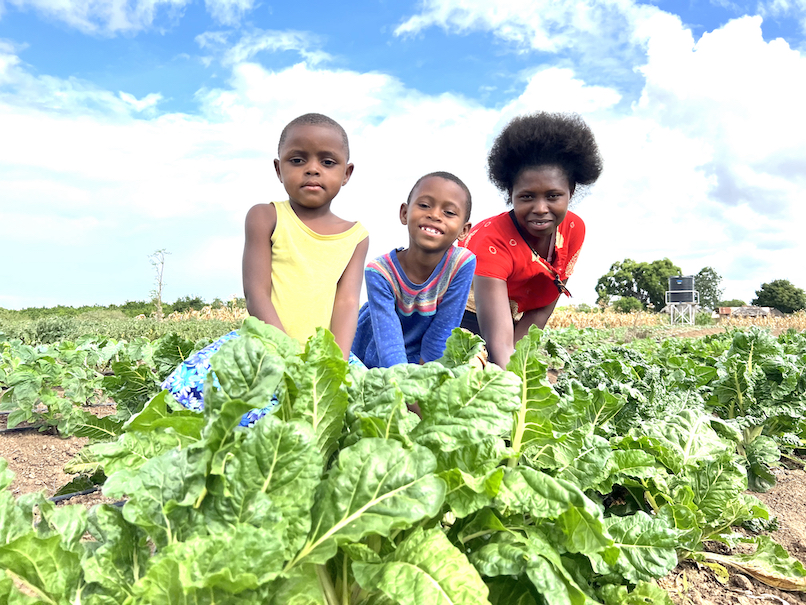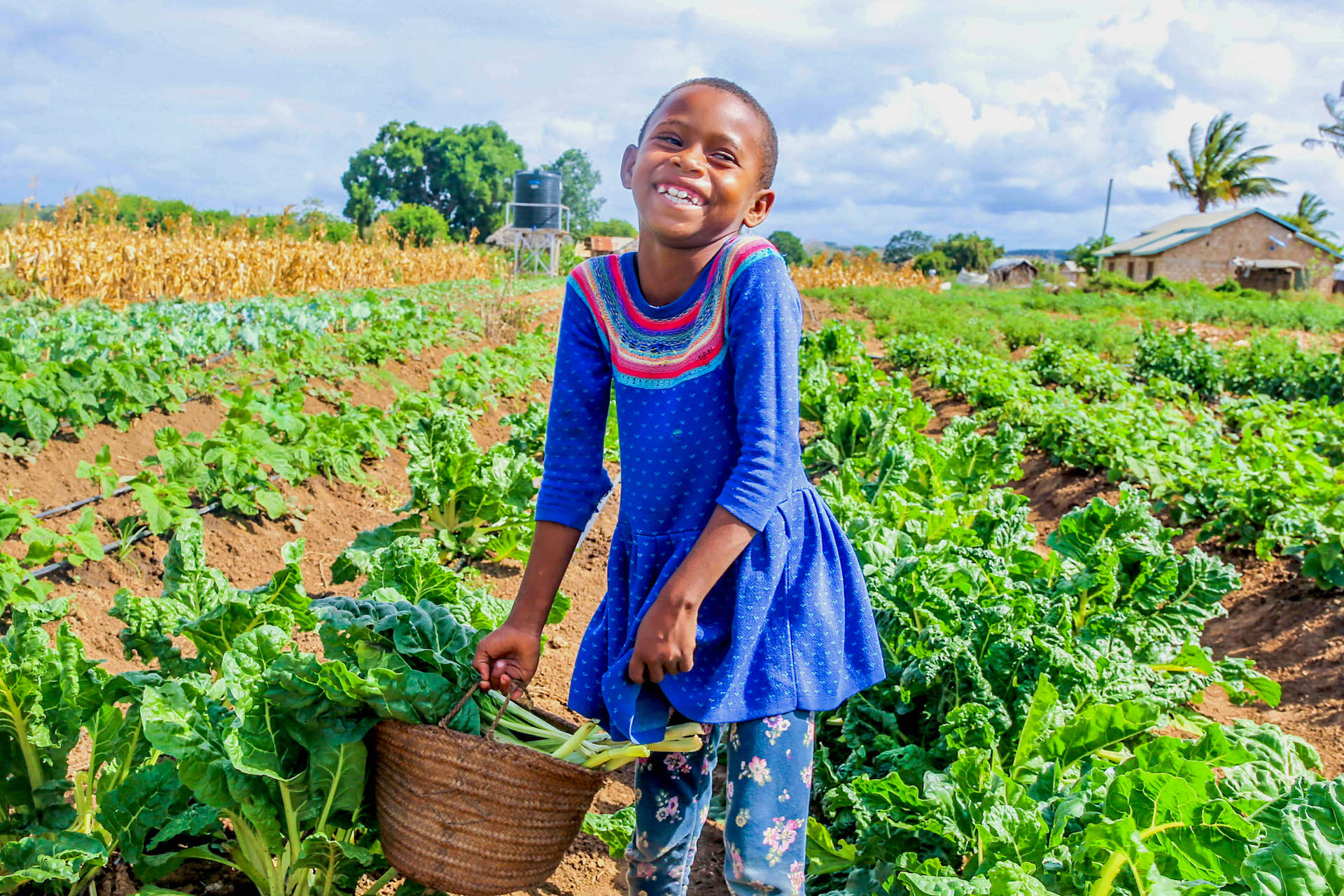Drip irrigation enhances families’ production of safe food for a healthy tomorrow in Kilifi, Kenya
By Martin Muluka, Emergency Communications Specialist, World Vision Kenya
Fourteen-year-old Stella spots a big bright smile as she tends to an assortment of healthy lush vegetables in her garden in Marafa, which is situated in Kilifi County, Kenya. She leads her siblings in harvesting ready tomatoes, spinach and sweet pepper for lunch.
“I like spending time in the farm when I am not at school. My brother and sisters like helping to water the vegetables too. Life was not like this before. My mother used to plant maize in her garden. I felt happy seeing the seeds grow into beautiful plants when it rained. I would be looking forward to a lot of food when the maize matured but when it stopped raining, they would all die,” says Stella
“I felt sad for times were hard for us because there wasn’t enough food to eat. I would come home at lunch time and find nothing to eat. Concentrating in class was not easy as I would be thinking of the food that was not available. Sometimes in the evening when there was no food too, my mother would tell me stories [about her childhood]. She says that when she was my age, it used to rain often and she had enough food to eat,” she notes.
“I always dreamt of growing up in a garden with plenty of food just like my mother. My dream came true when World Vision brought us a drip irrigation kit. We worked hard with my mother and I was not sure if the vegetables would grow but now, it is my favourite place to be when not in school,” says Stella.
“I help my mother grow kales, cabbages, maize and spinach after school. The plants look beautiful. Of all the crops, I like spinach because it looks beautiful and it is sweet. My mother is happy and says it now feels like it felt when she was growing up,” says Stella gleefully. “I don’t worry about lunch anymore because there is enough food at home. My mother’s food is now delicious because she cooks it with sweet pepper and fresh cucumbers.”
“My home is not far from school. My friends visit me often and help in the farm. We have fresh maize now and after eating we play in the shade of trees around the farm.”
Grace looks at her farm with pride and is not worried that her daughter Stella will lack food or schooling due to lack of school fees. She says that drip irrigation kits coupled with climate smart agriculture training has made a big difference for her family and community members.
“It made me realise that I had to depart from the conventional way of doing farming. The environment has changed and we have to change too. Using skills that I was taught by World Vision, I grow food that is safe for consumption and that is sustaining my family for a healthy tomorrow. In addition, learning how to save money got from selling surplus vegetables has made me financially secure" she says.

Acute food insecurity remains elevated in Kilifi County. About 4.2 million people are facing food insecurity in Kenya according to latest data from the government. Humanity finds itself strapped by conflict, a climate that won’t stop warming and rising prices. Stella resides in one of the areas that is adversely affected by below-average crop and livestock production seasons, as well as high inflation, despite its proximity to the Indian Ocean.
Water availability remains low in this area as most open water sources such as seasonal rivers, water pans and dams have dried up. People walk for about 8 to 15 kilometres to look for water in far away places, according to the latest National Disaster Management Authority (NDMA ) update. Yet, they previously used to walk for about 2 to 8 kilometres to access nearby water sources

Under the Kenya Integrated Emergency Response Project (KIERP) funded by the USAID Bureau for Humanitarian Assistance, World Vision is rolling out emergency nutrition interventions aimed at addressing these challenges affecting the community.
“Our interventions are built around reducing the impact of malnutrition. We then layer response, recovery and adaptation programmes around them. For example, our first step is to roll out mass screening of malnutrition. As women come to the clinic for screening and care, they receive safe water that has been trucked,” says Dennis Mramba, the Project Manager.
“In addition, they can be registered for cash transfer to help them meet their household food needs. In the long run, water pans and shallow wells built by the organisation have been a game changer in providing water for drip irrigation,” he notes.
The organisation is working with various hospitals to ensure children with acute malnutrition, which results from either inadequate energy or protein intake, get Ready to Use Therapeutic Food (RUTF), commonly known as Plumpy Nut.
This nutrition supplement, recommended by the World Health Organisation, supports rapid weight gain derived from broad nutrient intake, which can alleviate a starving child from impending illness or death.
World Vision has also gone further to build the capacity of community health volunteers, mothers and care givers to identify children suffering from acute malnutrition using the Mid-upper Arm Circumference (MUAC) tape. This has helped in early detection and intervention to reduce the effect of malnutrition in children under five years.
To meet their immediate food needs, the organisation is doing unconditional cash transfer to households with malnourished children, because they are usually the most vulnerable. The resilience and livelihoods component of the project involves linking parents from vulnerable households to mother-to-mother support groups. The mothers are supported by World Vision to learn about effective agricultural techniques and advised to get drought resistant seeds, as well as farm inputs for establishing kitchen gardens and practicing crop farming.
Aside from the food crops grown within their home compounds, the women also farm collectively in large pieces of land with continuous water supply for irrigation, thanks to World Vision’s water projects such as water trucking, rehabilitation of shallow wells and construction of earth pans in dry areas.
World Vision Kenya in its strategy aims to improve the lives of eight million children like Stella by 2025. Innovative programs like the Kenya Integrated Emergency Project are playing a pivotal role in improving their well-being.